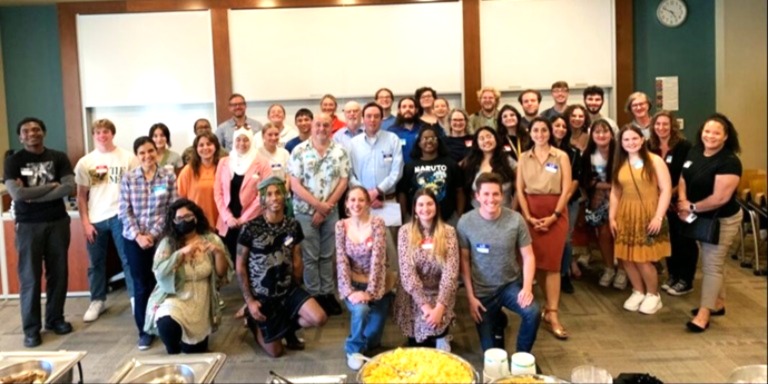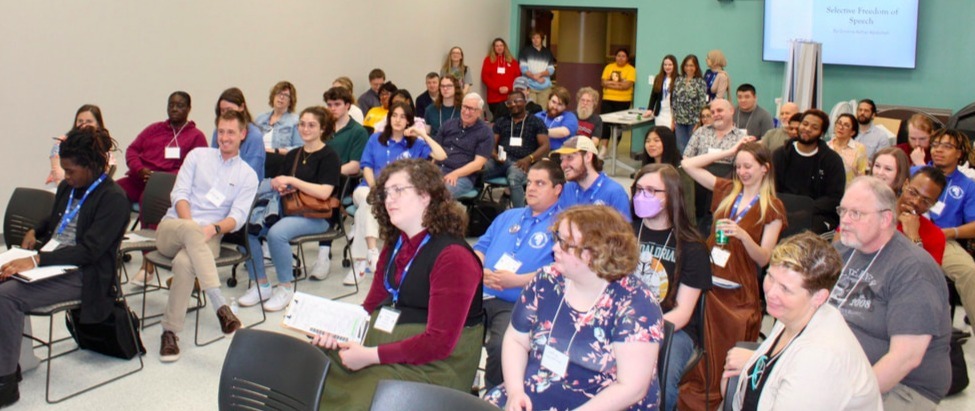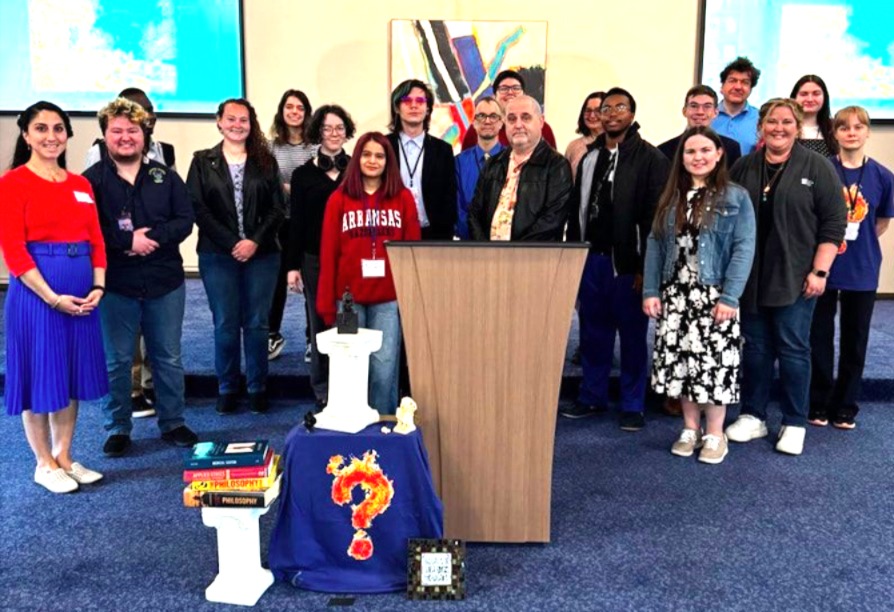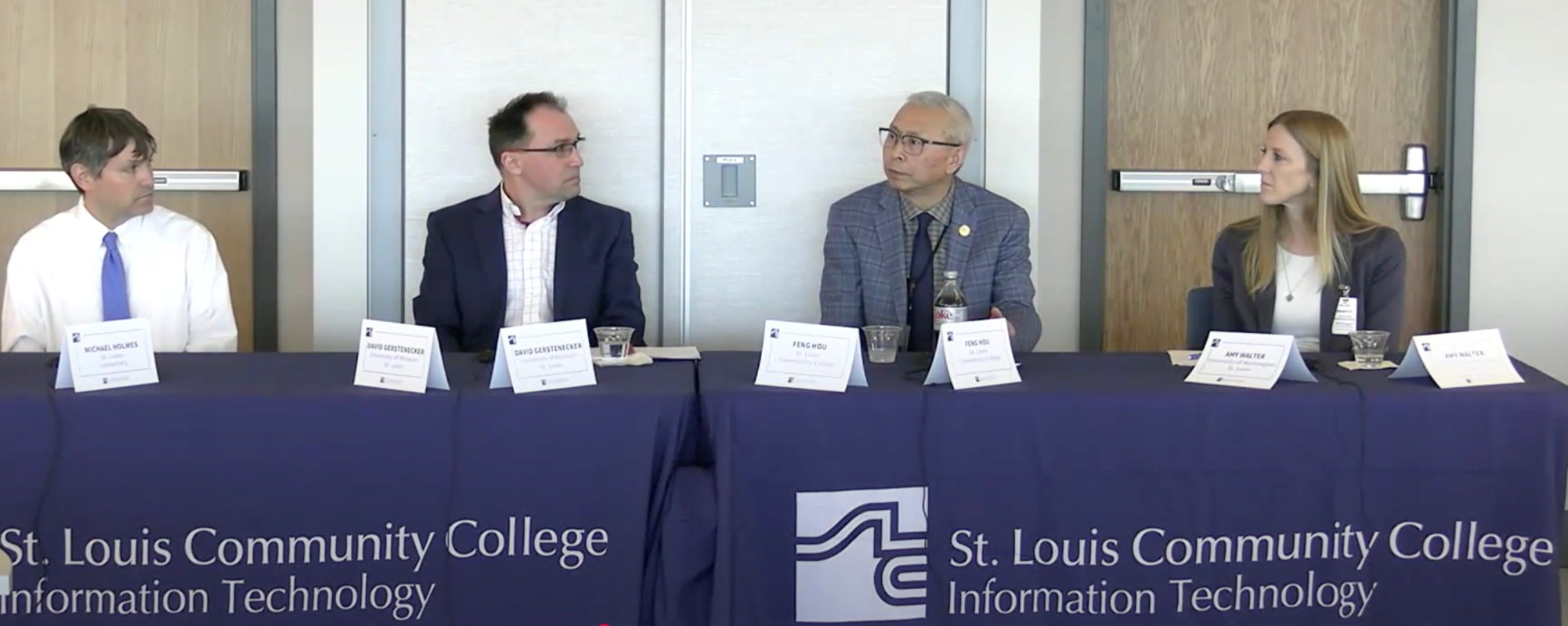Innovating Civic Discourse From the Community College Outward

Across the globe, there is political division, civil unrest, declining trust in public institutions, and a vanishing practice of befriending neighbors. Civic discourse is more necessary than ever for building communities, and more endangered as well. In ancient times, the marketplace was where people interacted and connected. Today, many people spend more time looking at screens than faces. So, where can community members gather, listen actively, and disagree respectfully?
What follows is a brief case study of how the author, a professor at St. Louis Community College (STLCC), successfully creates spaces that transform students into community members. The examples are replicable and demonstrate that community and belonging can be spread through innovation, and without a big budget.
The Problem: A Missing Infrastructure for Civic Conversation
In 2023, the U.S. Department of Health and Human Services released a report noting an epidemic of loneliness in America, one that can be healed through social connection and community. In the report, U.S. Surgeon General Vivek Murthy asserted that in schools, teachers can improve peer relations through cooperative learning projects (U.S. Department of Health and Human Services, 2023). In the community college classroom, for example, students sit together as professors facilitate dialogue through group projects and activities such as think-pair-share. However, “make friends” is not among standard course outcomes. Academic settings can feel removed from the everyday concerns of community college students who are often faced with balancing jobs and caregiving in addition to the content of their next exam.
Solution: The Community College as Civic Commons
To be innovative means, minimally, to take bold risks in the endeavor of creating a better way to do something. Through innovative thinking, the author creates environments that foster critical thinking, which leads to respectful conversations within and beyond the classroom.
In April 2023, the author organized a philosophy conference at STLCC. The event gave 13 students an opportunity to present their original philosophical views in front of an audience of their peers, professors, and family. At this conference, which was attended by over 80 people, students practiced public speaking, gained confidence in themselves, made friends while practicing respectful disagreement, and practiced listening to peers. One student spent hours with their English professor, Nancy Clemens, for one-on-one support on the paper before delivering it at the conference.

Philosophy conference audience, STLCC, April 2023
In September 2023, the author’s project of building spaces for students to practice thinking, listening, and holding respectful conversations went city-wide. She collaborated with the Philosophy Department Chair at Webster University, Bruce Umbaugh, who agreed to fund a mixer for all undergraduate students in the St. Louis area interested in philosophy. All philosophy professors in the region were invited, and professors from STLCC, Webster University, Jefferson College, University of Missouri–St. Louis, Southern Illinois University–Edwardsville, and Fontbonne University, as well as about 50 students, signed in. The event blended socialization, professional networking, and intellectual rigor. Activities included small-group conversations about popular thought experiments in philosophy, such as The Trolley Problem, and informal discussions about what it’s like to pursue philosophy as a profession. One STLCC student met a professor from the University of Missouri-St. Louis and the two still maintain a mentoring relationship.
In April 2024, the author organized a regional philosophy conference by collaborating with the Philosophy Department at the University of Missouri–St. Louis. Just as before, she invited undergraduate philosophy students in the area to submit original work, organized students to use a rubric for reviewing submissions, and connected students selected for presentation with a student commentator on their work at the podium. Sixteen students presented their ideas alongside keynote speaker Denish Jaswal, a graduate student at Harvard. In addition to learning about Jaswal’s research, students asked her questions such as what it is like applying to a doctoral program and heard her thoughts on pursuing a career in philosophy.
In May 2025, the author repeated the conference model, this time collaborating with the Philosophy Department Chair at Saint Louis University, Scott Ragland. Results mirrored previous events: high attendance, meaningful conversations, and building community. Students at the community college showcased their academic talents and professionalism in front of professors from schools to which they may apply, including Washington University in St. Louis.

People from STLCC at philosophy conference, St. Louis University, May 2025
On four college campuses in St. Louis, the author created spaces for students to practice the essential act of citizenship, talking with people in their communities about topics that matter, and they showed up. These events address a structural gap in higher education: the lack of informal spaces where students can practice respectful disagreement on controversial topics.
Next Steps
Supporting Innovation in Action
Community colleges can support faculty who want to extend their teaching into civic life. But how? Supporting innovative actions includes spreading the word about what people are doing, honoring their work, and inspiring others to follow suit. College administrators can also recognize and encourage innovation by being present. For instance, STLCC’s Florissant Valley Campus President, Dr. Elizabeth G. Perkins, attended the 2025 philosophy conference organized by the author. Perkins spent time speaking with several students about their ideas. It’s easy to imagine how empowering it must have been for the students to be complimented on their intellectual talent by their campus president. Seeing Dr. Perkins in the audience made the author’s efforts feel recognized and supported her goal for the event: to create a professional development opportunity for students that involves civic discourse around philosophical content.
Expanding Collaboration Between Community Colleges and Universities
Collaborating across colleges should be more commonplace. Businesses collaborate—community colleges should follow suit by either joining in or creating the space for partnerships and meaningful conversations. The following endeavors have been facilitated by STLCC.
In March 2025, the author initiated, organized, and moderated an event at STLCC in her capacity as a member of the AI Governance Committee, under the leadership of Renita Luck, Associate Vice Chancellor for Distance Learning and Academic Support. A panel of leaders from STLCC, University of Missouri-St. Louis, Washington University in St. Louis, and St. Louis University met for the first time to discuss the effects of technology such as ChatGPT on higher education. Despite vast differences in funding, almost all colleges and universities are dealing with the same challenges in the face of AI: how to incentivize students to enroll in classes despite the growing free, on-demand access to information online; how to inspire students to maintain academic integrity; how to keep data safe; and how to upskill employees given revolutionary technology. At this event, the chief information officers from four institutions that share goals, students, and industry partners had an opportunity to contribute insights and brainstorm solutions. Bringing these leaders together was an innovative strategy for enhancing teaching and learning with emerging technologies.

Panel on AI in higher education, STLCC, March 2025
Additionally, STLCC presents a State of the St. Louis Workforce report on regional workforce trends, employer concerns, and industry highlights each summer. The information is gathered and processed by Phyllis Ellison, STLCC’s Associate Vice Chancellor of Workforce Solutions. She collaborates with the State of Missouri's research arm, Federal Reserve Bank of St. Louis, and Missouri SourceLink. Over 300 people attend these annual events, at which Ellison presents the report to an audience including leaders from economic development and civic organizations, K-12 districts, industry organizations, businesses, nonprofits that support workers, and high school training programs. After the presentation, STLCC Chancellor Jeff Pittman moderates a panel discussion on industry trends. This is a strong example of how community colleges can set the stage for meaningful, data-informed partnerships that build community.
Concluding Remarks
Community colleges are uniquely situated to experiment with innovative ways to serve their local communities. This begins by bringing people together for thoughtful conversations. From philosophy conferences at which students present their ideas to panels for leaders in information technology, events that facilitate respectful conversation and build community can move the needle on and contribute to the broader goal of improving civic discourse.
Reference
U.S. Department of Health and Human Services. (2023). Our epidemic of loneliness and isolation: The U.S. Surgeon General’s advisory on the healing effects of social connection and community. Office of the Surgeon General. https://www.hhs.gov/sites/default/files/surgeon-general-social-connection-advisory.pdf?ueid=a6a91c99b86e9539783269cb1d6db6fe
Lead image: Philosophy mixer group, Webster University, September 2023
Sahar Joakim Resch, Ph.D., is Associate Professor, Philosophy, at St. Louis Community College in St. Louis, Missouri.
Opinions expressed in Innovation Showcase are those of the author(s) and do not necessarily reflect those of the League for Innovation in the Community College.










